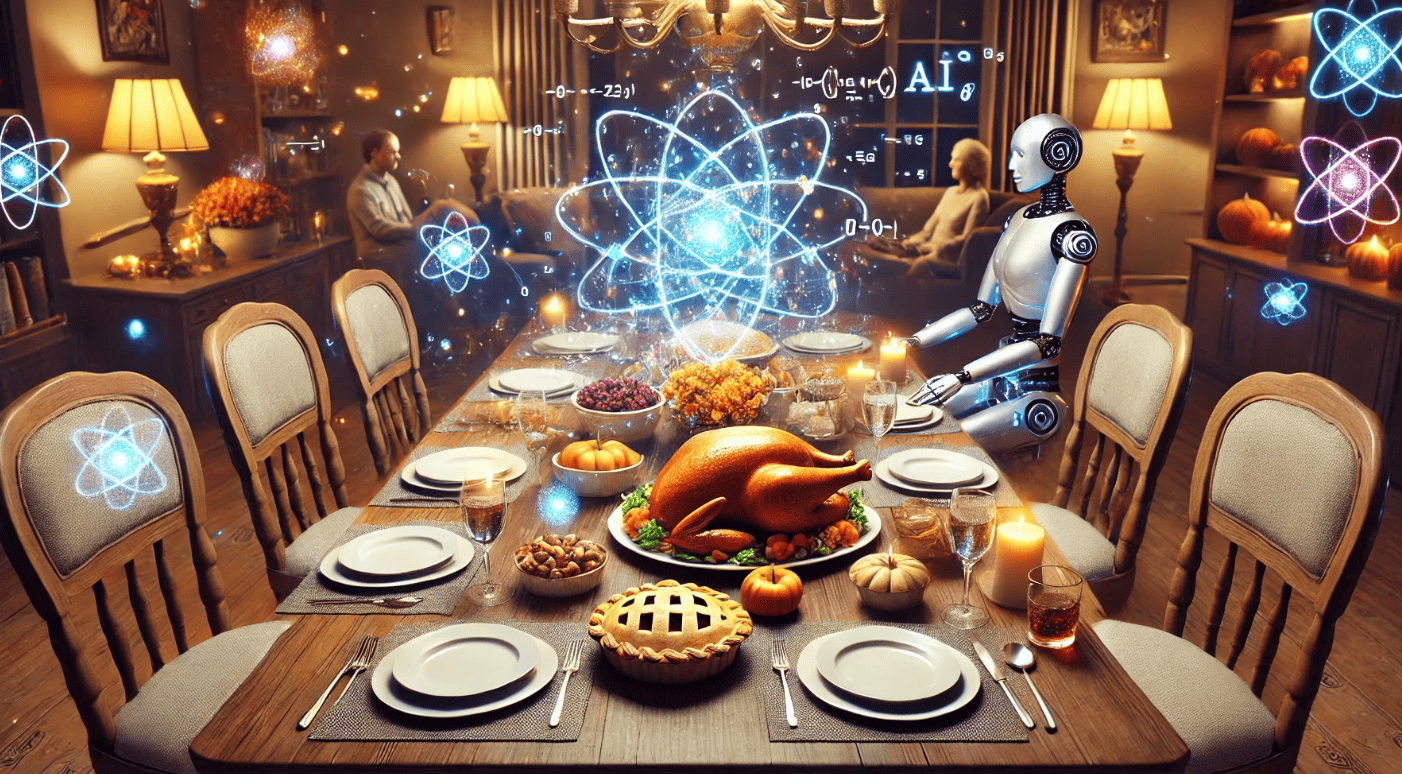Quantum Thanksgiving — Why You Should Give Thanks (ThanQs?) For Quantum Mechanics During This Season of Gratitude

It’s customary for Americans to gather around the dinner table on the last Thursday of November and at least pause to reflect on all their reasons to be grateful.
And there’s a lot to be thankful for — from health to financial security, from family and friends to your ability to successfully avoid violence while breathing the same air as an in-law who vocally espouses an opposing political ideology.
The list is full — but maybe you forgot a line on your gratitude list. Have you ever thought of the largely hidden science that makes much of the holiday possible? Many of the conveniences we take for granted during Thanksgiving owe their existence to quantum mechanics. From the ovens that roast the turkey to the GPS systems guiding family members home, quantum principles are quietly at work.
Let’s take a look at how quantum physics shapes the modern Thanksgiving experience.
Cooking, Quantum-Style
If you have ever used the microwave to heat up some of the dishes served at the Thanksgiving dinner table, or zapped the leftovers that you swore you could not possibly eat a mere hour and a half after leaving the dinner table, you can thank science’s mastery of quantum physics. Microwave ovens, a staple for quick heating, rely on quantum principles. They work by emitting photons that interact with water molecules, causing them to vibrate and generate heat—a direct result of quantum energy levels.
Induction stovetops, another high-tech kitchen tool, depend on electromagnetic induction. This process harnesses quantum mechanics, particularly the behavior of electrons and magnetic fields, to create efficient, flameless heat.
And that helps you cook faster, while better managing precise temperature control for all of those side dishes
Keeping the Feast Fresh
In my experience, two groups honor refrigeration above all others: superconducting quantum computing engineers and cooks.
Although not directly related to quantum devices, refrigerators do operate on thermodynamic principles refined through quantum insights. Advanced cryogenic freezing technologies — which are definitely rooted in quantum thermodynamics — are used to transport perishables like turkeys across the country.
Think about that when you’re pulling that drumstick out of the fridge for that late-night snack.
Bringing Families Together
Quantum mechanics doesn’t just cook and preserve the food — it helps bring loved ones over the river and through the woods much more efficiently these days and it keeps them occupied after they arrived.
For families navigating holiday traffic, GPS systems are indispensable. These systems depend on atomic clocks, which measure time with astounding precision thanks to quantum mechanics. Without them, finding Grandma’s house might be more of an adventure than planned. In the future, quantum sensors could help you find grandma’s house, especially if she lives in hostile territory where warring factions are using signal jamming and spoofing techniques to deny access those space-based GPS signals. While there, you may want to encourage grandma to relocate to a better neighborhood.
For those who happen, through a horribly twisted seating chart, to be sharing pumpkin pie at the table next to the obnoxious fiancé of your third cousin — —the one who can’t stop mentioning ‘Lambo’ every third sentence — your smartphone might be your lifeline (and, quite possibly, his). Of course smartphones and computers operate using transistors. These tiny devices are built on quantum principles, manipulating electron behavior to process and store data.
Football, in Quantum High Definition
No Thanksgiving is complete without football, and today’s televisions make the game more vivid than ever. OLED and QLED TVs use quantum dots—nanocrystals whose size dictates the color of emitted light.
This quantum phenomenon creates the bright, lifelike colors that bring the action on the field to your living room.
It likely will not make the Cowboys’ offense any better, but, still…
Quantum-Enhanced Beverages
Whether your Thanksgiving includes wine, beer, or coffee, quantum chemistry plays a part. Fermentation, the process responsible for crafting these beverages, involves molecular reactions best understood through quantum-level analysis.
Brewers and winemakers increasingly use quantum insights to refine flavors and ensure quality, giving your celebratory toast a scientific twist.
Lighting the Holiday Spirit
Although there are some Christmas crazies in every neighborhood who insist on draping their property in Chirstmas regale on Nov. 1, the Thanksgiving holiday generally marks the time for holiday lights and decorations. But just thing, if you use modern LED lights, which often adorn homes and tables, you’re actually relying on the science of quantum mechanics to emit light. Electrons in LEDs drop to lower energy states, releasing photons — a process described by quantum principles.
So, there you have it. Give quantum mechanics its props this holiday weekend.
And happy ThanQsgiving!
